This year’s Virtual Ocean Pavilion will feature a wide range of events covering topics across the ocean-climate-biodiversity nexus. A preview of some of the events developed with our collaborators this year is included below. Please be sure to register for the COP29 Virtual Ocean Pavilion to access the full agenda available from the Event Lobby. We hope you will join us at this year's Pavilion from 6-22 November 2024!
 November 6, 2024 13:00
November 6, 2024 13:00 Mr. Richard Delaney
Mr. Richard Delaney Ambassador Peter Thomson
Ambassador Peter Thomson Ambassador Janine Coye-Felson
Ambassador Janine Coye-Felson Mr. Duncan Currie
Mr. Duncan Currie Ms. Danielle Yeow
Ms. Danielle Yeow Ms. Johanna Diwa-Acallar
Ms. Johanna Diwa-Acallar Mr. Julio Cordano
Mr. Julio Cordano Ms. Loreley Picourt
Ms. Loreley Picourt Ms. Anna-Marie Laura
Ms. Anna-Marie Laura Ms. Thecla Keizer
Ms. Thecla Keizer Ms. Catie Mitchell
Ms. Catie Mitchell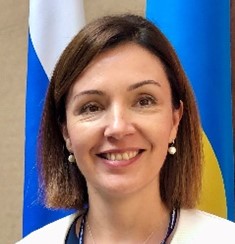 Ms. Viktoria Varga Lencses
Ms. Viktoria Varga LencsesThis event features speakers representing government, intergovernmental, and civil society organizations who will be speaking in two segments.
Segment 1 aims to discuss integrated and collaborative approaches used to advance the ocean agenda in the climate, biodiversity, and sustainable development frameworks. It will highlight the opportunities presented by the Agreement on Marine Biodiversity of Areas beyond National Jurisdiction (BBNJ Agreement) for leveraging the ocean-climate-biodiversity nexus in accelerating the implementation of ocean-climate action by exploring the mitigation and adaptation potential of the vast marine areas beyond national jurisdiction.
Segment 2 focuses on what’s to come for the ocean community at COP29 and will provide a preview of the COP29 Virtual Ocean Pavilion (VOP) and of ocean events at COP29 more generally. This segment will include a brief report on the outcomes of the 2024 Ocean and Climate Change Dialogue and high-level remarks on what to expect for the ocean from COP29 negotiations. Next, the Ocean Breakthroughs and other activities of the Marrakech Partnership for Global Climate Action (MPGCA) at COP29 will be presented, followed by a presentation on the activities of the Friends of the Ocean and Climate at COP29. An introduction to the Virtual Ocean Pavilion will then follow, including a preview of the Pavilion exhibits and live events and an overview of the searchable COP29 ocean-related events tracker and other Pavilion features.
AGENDA
Event Organizers: Global Ocean Forum and Plymouth Marine Laboratory
 November 11, 2024 13:00
November 11, 2024 13:00 Dr. Niels Krabbe
Dr. Niels Krabbe Dr. Rachel Tiller
Dr. Rachel Tiller Dr. Emma Cavan
Dr. Emma Cavan Mr. Fuad Bateh
Mr. Fuad Bateh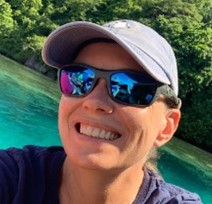 Ms. Karen Stone
Ms. Karen Stone Dr. Natalya Gallo
Dr. Natalya Gallo Dr. Richard Sanders
Dr. Richard SandersThe Ocean carbon cycle plays a crucial role in regulating the global climate, taking up approximately 25% of the CO₂ emitted into the atmosphere and separately storing massive quantities of carbon in the Ocean interior, much of it via a series of processes known as the biological carbon pump. The ocean carbon cycle thereby increases the ocean’s ability to reduce atmospheric carbon. While recent evidence indicate that terrestrial carbon sinks appear to absorb less carbon than previously assumed, the potential of the oceans remain largely unexplored and untapped, as it so far has not been considered in management. As international law and policy is evolving, this may however be about to change.
This online seminar hosted by the World Maritime University and the EU Horizon Project Ocean ICU discusses the ocean carbon cycle from different perspectives. Integrating presentations on recent scientific findings with perspectives on how ocean carbon should be considered in policy and how it connects to the UNFCCC as well as the new global oceans agreement (BBNJ), it aims to promote a more focused discussion on ocean carbon in climate negotiations.
AGENDA
Event Organizers: World Maritime University and EU Horizon Project Ocean ICU
 November 11, 2024 14:45
November 11, 2024 14:45 Dr. Jack Dyer
Dr. Jack Dyer Mr. Chien Chih Chen
Mr. Chien Chih Chen Ms. Kirsty Schneeberger
Ms. Kirsty Schneeberger Dr. Indumathie Hewawasam
Dr. Indumathie Hewawasam Mr. James Merchant
Mr. James Merchant
14:45 - 15:45 Azerbaijan Time (GMT+4)
"Ocean Finance is Climate Finance: The ocean is integral to achieving the goals of the Paris Agreement and therefore must be included in climate financing. Availability and access to funding for the ocean must be increased, whilst mobilizing additional finance flows for ocean-based solutions, that are backed by robust science and independent of industry. This could be achieved by adopting an ambitious New Collective Quantified Goal (NCQG), finalizing Article 6 of the Paris Agreement and accelerating the delivery of the Loss & Damage Fund." This is one of the key messages that the COP29 Virtual Ocean Pavilion is promoting this year.
The global blue economy is estimated to reach US$3 trillion or more by 2030. Following COP16 for biodiversity and COP28 for climate change, stakeholders are facing unprecedented mobilisation of resources channelled towards them following a “Blue Economy paradigm. Over US$351,492,164 in climate finance and $3,845,000,000 in ocean finance has been mapped, including thousands of related marine/coastal initiatives under the UN Ocean Decade.
Yet, there are many concerns about major financing gaps in the desire to ensure effective resilience and adaptation to changing climate, ocean, conservation, biodiversity, equity and other hazards. Few sources have bothered to assess where financial and other resources are going, how effective are they at delivering outcomes, and how this relates to geopolitics, psychology, conservation and other factors. Until now, the role of ocean and blue finance has been comparatively silent and marginalised in the COP process, despite increasing interest from venture capitalists, innovators, accelerators and incubators, governments with blue bonds, philanthropists, multilateral organisations, corporations, communities, blue carbon, ecosystem credits, insurers, bankers and others. Existing blue economy theory does not conceptually address the role of finance and effective resource mobilisation, nor how that can help or hinder the Blue Economy agenda regionally and locally.
A Roundtable on this topic is being organized to provide attention to policymakers and other attendees to consider what role and value, blue finance can play in the COP process. It can provide a forum to discuss insights and experiences with a view to encouraging the acceleration of success, identification and overcoming existing barriers and failures, inspiring new solutions and opportunities, providing more clarity on a direction forward, providing more inspiration and partnerships to direct blue finance to more effective, equitable and sustainable outcomes, along with enhancing greater awareness, interest and belief as a basis to mobilise such funding for climate change and other major associated issues.
Fourty seats are available for this roundtable discussion on a first-come, first-serve basis.
AGENDA
KEY DISCUSSION QUESTIONS
ROUNDTABLE PARTICIPATION
To participate in this roundtable, please click the "Roundtables" tab in the top navigation bar. On the Roundtables page, click the JOIN NOW button for this roundtable at the start of the event. Please note that the JOIN NOW button will not be available until the event start time at 14:45 Azerbaijan Time (GMT+4).
 November 11, 2024 16:00
November 11, 2024 16:00 Dr. Aaron Carlisle
Dr. Aaron Carlisle Dr. Matthew Oliver
Dr. Matthew Oliver Dr. Serena Hackerott
Dr. Serena Hackerott Dr. Kimberly Oremus
Dr. Kimberly OremusJoin us for a panel exploring cutting-edge technologies and methods advancing ocean biodiversity conservation and climate resilience. The panel will address how technological advancements can be adapted and transferred to underserved communities, bridging technology with practical ocean solutions.
AGENDA
Event Organizers:
Gerard J. Mangone Climate Change Science and Policy Hub
School of Marine Science and Policy, University of Delaware
 November 11, 2024 18:00
November 11, 2024 18:00 Dr. Matt Frost
Dr. Matt Frost Dr. Filimon Manoni
Dr. Filimon Manoni Dr. Margaret Leinen
Dr. Margaret Leinen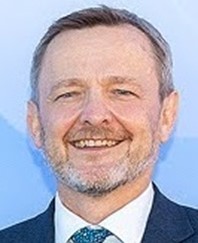 Mr. Dominic Pattinson
Mr. Dominic Pattinson Ms. Katherine Arroyo Arce
Ms. Katherine Arroyo Arce Mr. Julian Barbiere
Mr. Julian Barbiere Mr. Andrew Stephens
Mr. Andrew StephensThis event focuses on collaborative approaches used to enhance the conservation and sustainable use of the ocean and its resources, such as mobilizing finance, harnessing diverse forms of cooperation at various levels, and leveraging ocean-climate-biodiversity interlinkages. It aims to identify key messages for wide-ranging stakeholders and priority strategies for promoting integrated approaches to ocean governance in the context of climate change and relevant governance frameworks, including the Paris Agreement, the Kunming-Montreal Global Biodiversity Framework, the Agreement on Marine Biodiversity of Areas beyond National Jurisdiction (BBNJ Agreement), SDG14 and related SDGs.
This event features leaders from various ocean sectors working on collaborative approaches to drive initiatives and innovation to protect the ocean and catalyze the development of sustainable ocean solutions.
AGENDA
Event Organizers: Global Ocean Forum and Plymouth Marine Laboratory
 November 12, 2024 18:00
November 12, 2024 18:00 Prof. Mary S. Wisz
Prof. Mary S. Wisz Prof. Ida-Maja Hassellöv
Prof. Ida-Maja Hassellöv Dr. Iain Staniland
Dr. Iain Staniland Michelle Sanders
Michelle Sanders Joseph Appiott
Joseph Appiott Camille Bourgeon
Camille Bourgeon Lisa Koperqualuk
Lisa Koperqualuk Dr. Melanie Lancaster
Dr. Melanie LancasterIn 2023, the International Maritime Organization (IMO) adopted a strategy for net-zero emissions by or around 2050, driving major changes in shipbuilding, operations, policy, and regulations. These changes also create wide opportunities to reduce biodiversity loss and pollution from shipping. This panel will examine how cross-disciplinary science, international agreements, and national and private sector actions can converge for the shipping sector to address the triple planetary crisis as it decarbonizes. While our focus will be on the Arctic, the discussion will have broader implications.
AGENDA
ORGANIZER: World Maritime University
 November 12, 2024 16:30
November 12, 2024 16:30 Travis Aten
Travis Aten Natalie Hart
Natalie Hart Bárbara Pinheiro
Bárbara Pinheiro Jen McRuer
Jen McRuer Monika Naranjo González
Monika Naranjo González Juliana Corrales
Juliana Corrales
16:30-17:30 Azerbaijan Time (GMT+4)
How can we advance the practice of strategic communication to achieve ocean action?
This roundtable will consider the question of how strategic communication can be effectively used at all levels of ocean action, from broad public engagement to targeted advocacy campaigns, to ensure a thriving ocean for all.
Building on the findings from the Communications Symposium held as an official satellite event of the UN Ocean Decade Conference in Barcelona April 2024, the roundtable will consider insights from the Advancing Strategic Ocean Communication Project and ask how we can drive ocean communication forwards. The roundtable will be framed with a brief introduction on the rising profile of strategic communication within the ocean community and advances that have taken place since the last VOP.
Suggested areas of discussion:
Moderator:
Invited speakers:
Roundtable Participation
To participate in this roundtable, please click the "Roundtables" tab in the top navigation bar. On the Roundtables page, click the JOIN NOW button for this roundtable at the start of the event. Please note that the JOIN NOW button will not be available until the event start time at 14:45 Azerbaijan Time (GMT+4).
There will be 20 seats available for this discussion, including seats reserved for speakers and moderators.
 November 18, 2024 16:30
November 18, 2024 16:30 Ms. Fiona Pelham
Ms. Fiona Pelham Dr. Bernadette Snow
Dr. Bernadette Snow Ms. Eugenia Merayo
Ms. Eugenia Merayo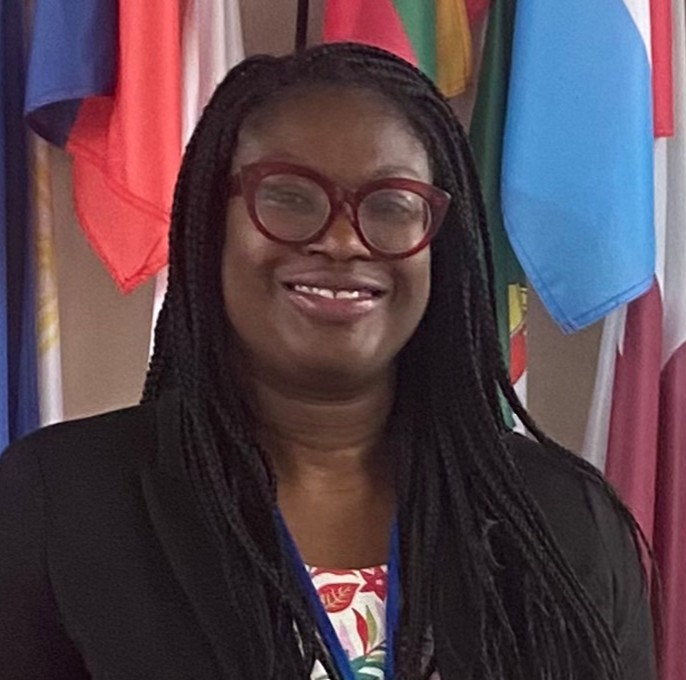 Dr. Bolanle Erinosho
Dr. Bolanle Erinosho
16:30-17:30 Azerbaijan Time (GMT+4)
Women and Oceans: Context, Challenges and a Case study
Woman and Oceans is a topic now receiving greater attention in multiple international spaces. The renewed attention notwithstanding, women continue to face gender disparities within ocean sectors. This impacts on their ability to participate in oceans science, law, governance and the sustainable economic development of the oceans. There are projects around the world to advance gender equity, include women's knowledge in decision making, and encourage women’s involvement in mitigating and adapting to the impacts climate change in the oceans. This roundtable will feature 3 speakers who will provide interventions on the context of women and oceans, challenges within maritime sectors and a case study on small scale fisheries in Ghana. Attendees will have an opportunity to ask questions before closing with critical reflection.
Objectives for session:
Moderator:
Speakers:
Agenda:
Roundtable Participation:
To participate in this roundtable, please click the "Roundtables" tab in the top navigation bar. On the Roundtables page, click the JOIN NOW button for this roundtable at the start of the event. Please note that the JOIN NOW button will not be available until the event start time at 16:30 Azerbaijan Time (GMT+4).
There will be 20 seats available for this discussion, including seats reserved for speakers and moderators.
 November 18, 2024 18:00
November 18, 2024 18:00 Ms. Anaïs Deprez
Ms. Anaïs Deprez Mr. Mark Haver
Mr. Mark Haver Ms. Iwona Gin
Ms. Iwona Gin Mr. Guillaume Lheureux
Mr. Guillaume Lheureux Aygün Karlı
Aygün Karlı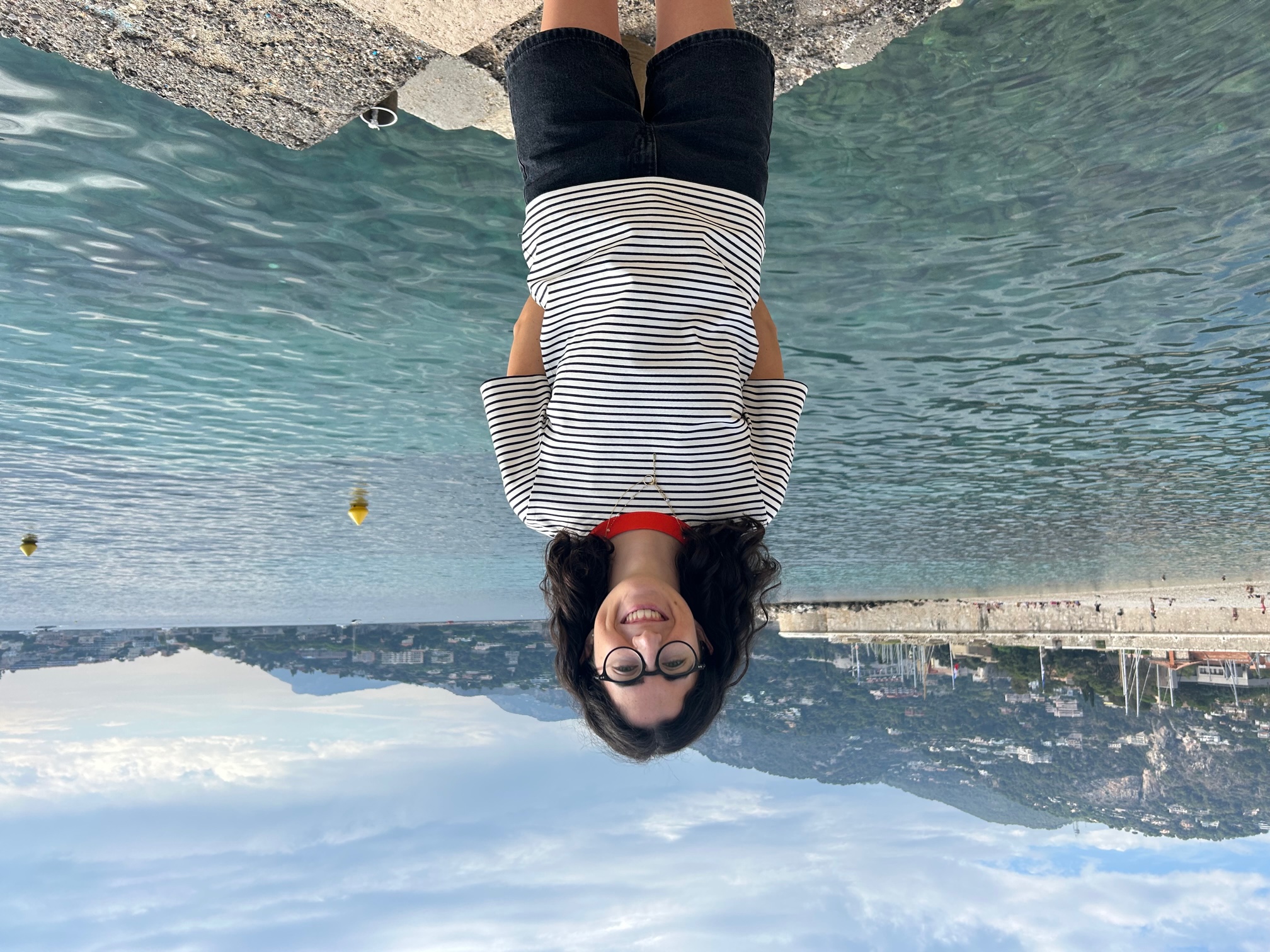 Lisa Picatto
Lisa Picatto Juliette Aminian-Biquet
Juliette Aminian-Biquet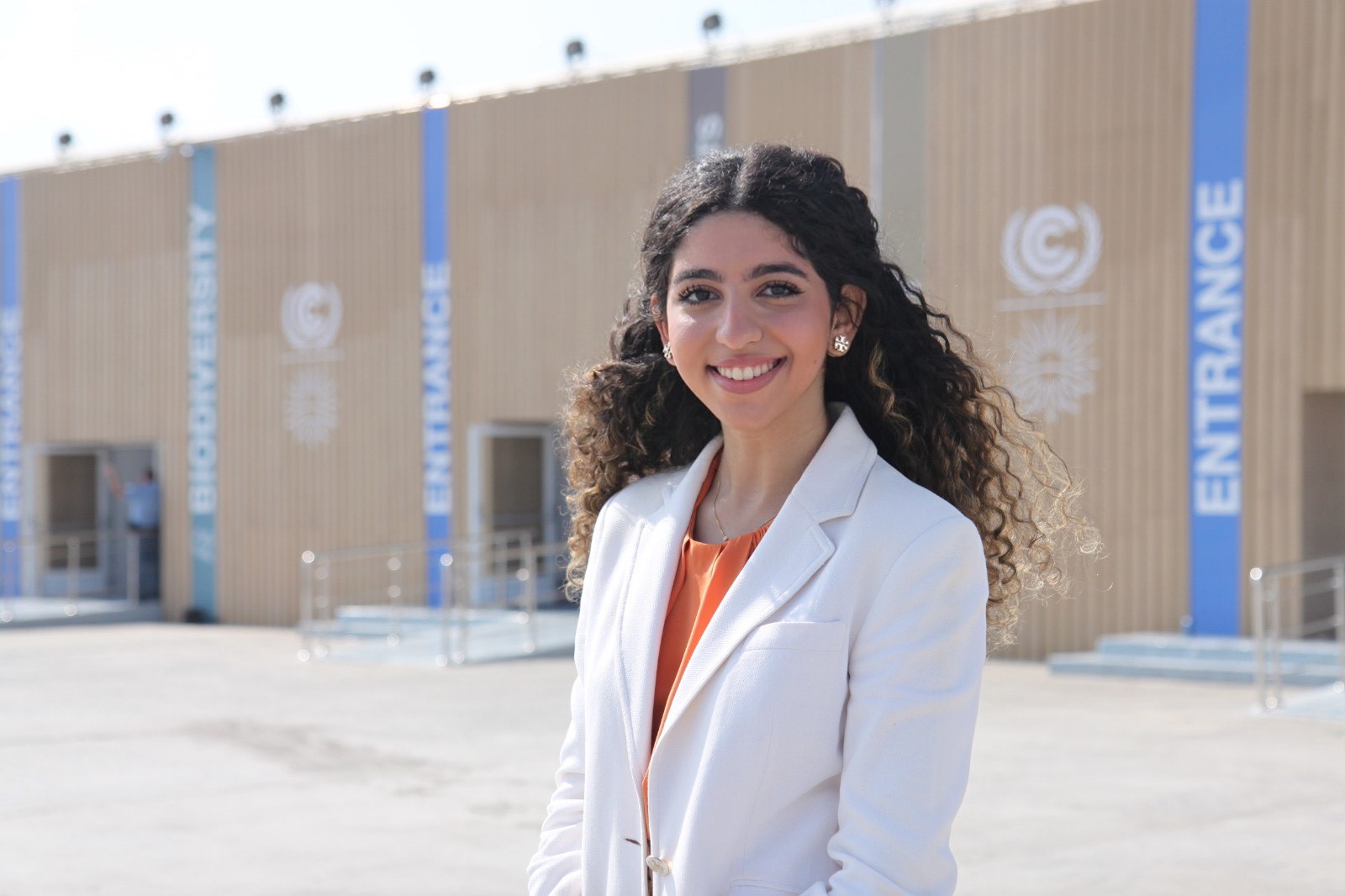 Dana Ahmed
Dana Ahmed Laura Khatib
Laura Khatib Léa Vicherat
Léa Vicherat Elisabeth Boucheron
Elisabeth Boucheron Mélinda Martins
Mélinda Martins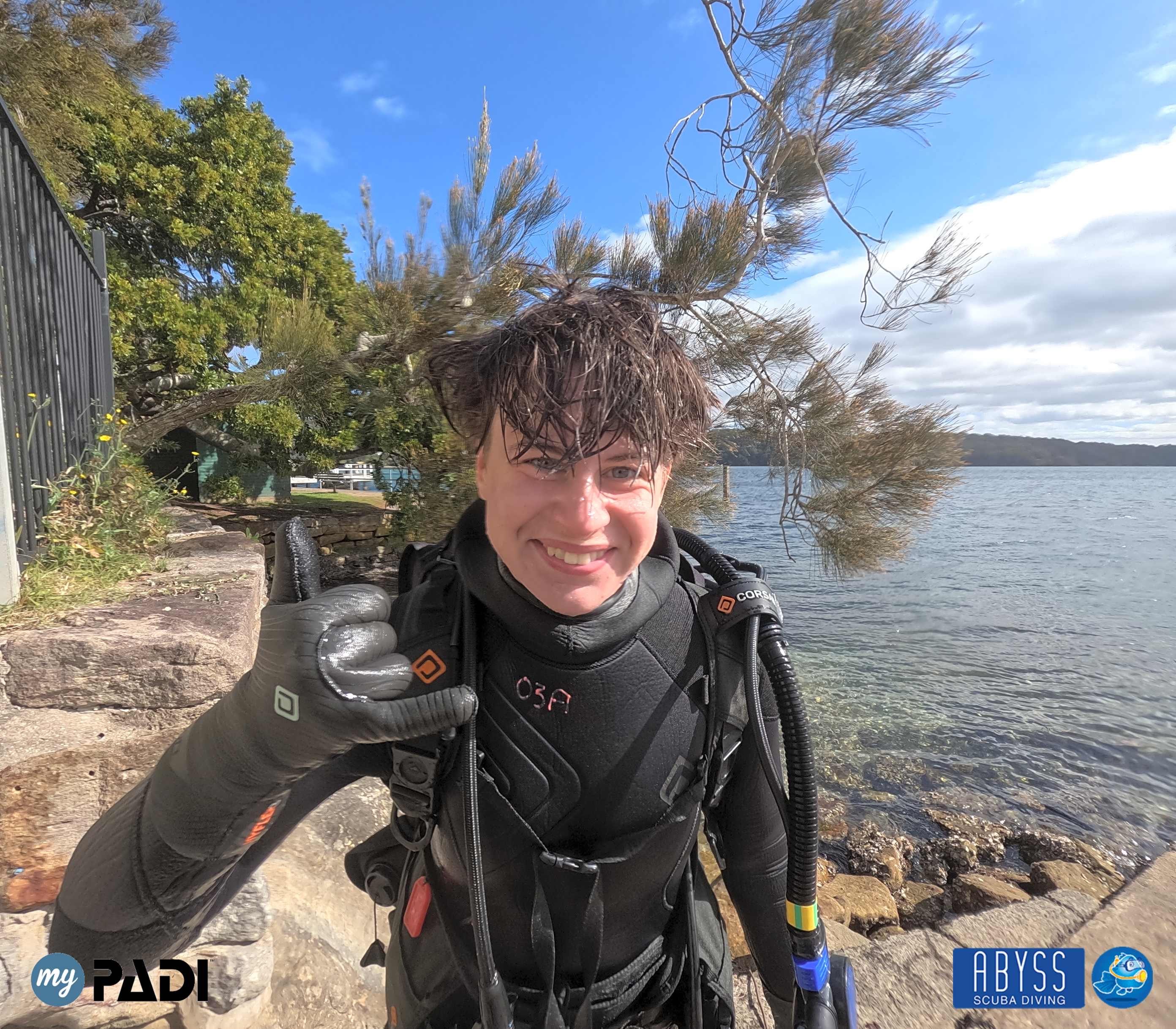 Joe Adams
Joe Adams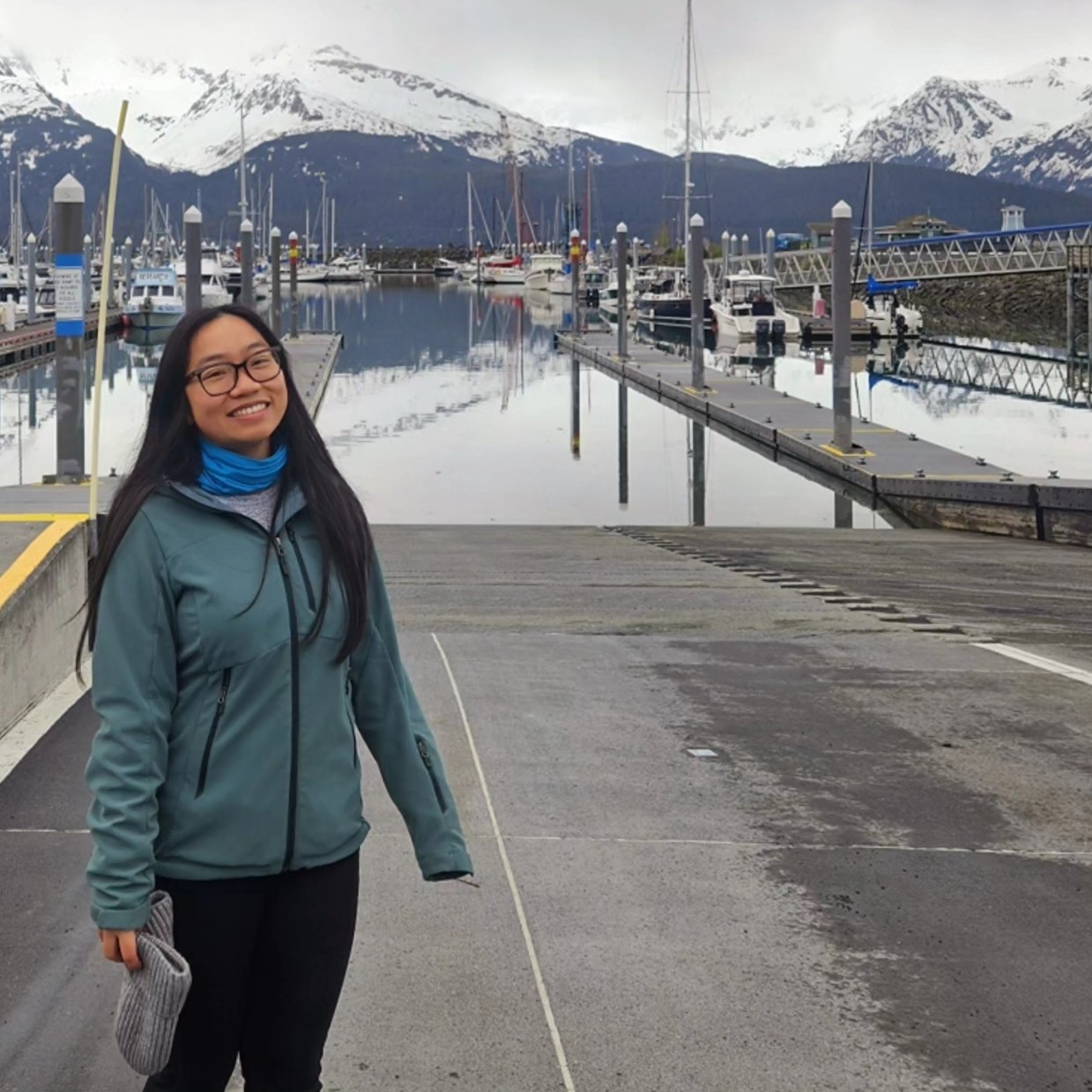 Emily Chen
Emily Chen Thaïs Giguet
Thaïs Giguet Maïna Proust
Maïna Proust Shayna Demick
Shayna Demick Alyssa Wentzel
Alyssa Wentzel Isabelle Kornas
Isabelle Kornas Ira Washington III
Ira Washington III
The purpose of this workshop is to identify youth priorities, concerns and aspirations in relation to the Challenge 10 of the United Nations Ocean Decade of Ocean Science for Sustainable Development, outline effective, practical and innovative ocean-based solutions to climate change, and develop messages for policy-makers to be included in a youth manifesto amplifying young people’s voices and making their visions for a better ocean governance heard and considered in real policy and societal shifts.
This workshop will be open to registered youth participants. Non-registered participants will be able to watch the discussions. The workshop will start with keynote speeches introducing the topic, followed by a series of breakout sessions where participants will generate, structure, categorize and cluster their ideas and messages to decision makers.
This workshop is part of a series of thematic preparatory youth events organised throughout the autumn and winter 2024 in view of the United Nations Ocean Conference to be held in Nice, France, in June 2025.
AGENDA
ORGANIZERS: Nausicaa, World Ocean Network, University of Delaware, Youth4Ocean Forum, Global Ocean Forum
Add events to calendar
 November 19, 2024 01:00
November 19, 2024 01:00 Dr. Peter J. Ricketts
Dr. Peter J. Ricketts Dr. La Daana Kanhai
Dr. La Daana Kanhai Dr. Julian Walcott
Dr. Julian Walcott Dr. Jack Dyer
Dr. Jack Dyer Mr. Christopher Corbin
Mr. Christopher Corbin Mr. Peni Suveinakama
Mr. Peni Suveinakama
Good governance of the ocean cannot be achieved by States acting individually.
In addition to reducing their own carbon footprint, educating future leaders, and contributing valuable research and expertise to the global effort to combat climate change, regional research and academic institutions can provide policy-relevant scientific information to decision makers and stakeholders to address ocean, climate, biodiversity, and sustainable use issues in their respective regions. Regional environment organizations such as the UNEP Regional Seas Programme implement region-specific activities, bringing together stakeholders including governments, scientific communities, civil societies, local communities and indigenous peoples to address environmental issues. Regional economic forums such as the Pacific Islands Forum are instrumental in shaping global trade, fostering cooperation, and driving economic growth in the regions.
This event convenes a panel of leaders from various regional research, academic, and action-oriented institutions to provide their perspectives on their organizations’ critical role in promoting the development and adoption of strategies to combat climate change. Panelists will also explore how to leverage their comparative advantage in supporting the development of collaborative ocean-based solutions in their regions that take into consideration ocean-climate-biodiversity interlinkages.
AGENDA
Introduction
01:00 Moderator: Dr. Peter Ricketts, Welcome and brief introduction of the event, its objectives, the format of the event (panel discussion) and the questions that panelists will be responding to
Panel Discussion Part 1
01:10 Guiding question: What is the nature of your organization's engagement in ocean-climate action and the extent to which it is contributing towards addressing the many problems associated with it in your region?
Panel Discussion Part 2
01:35 Guiding question: What measures should your organization take to leverage the ocean-climate-biodiversity interlinkages to maximize its contribution towards addressing the challenges associated with a changing climate in your region?
Closing
02:00 Q&A
02:20 Dr. Peter Ricketts, Wrap-up and closing remarks
Event Organizers: Global Ocean Forum, University of the West Indies (Cave Hill and St. Augustine), and University of the South Pacific
Add events to calendar
 November 21, 2024 14:30
November 21, 2024 14:30 Dr. Ina Tessnow-von Wysocki
Dr. Ina Tessnow-von Wysocki Dr. Genevieve Quirk
Dr. Genevieve Quirk Ms. Madeleine Pears
Ms. Madeleine Pears Dr. Miriam Balgos
Dr. Miriam Balgos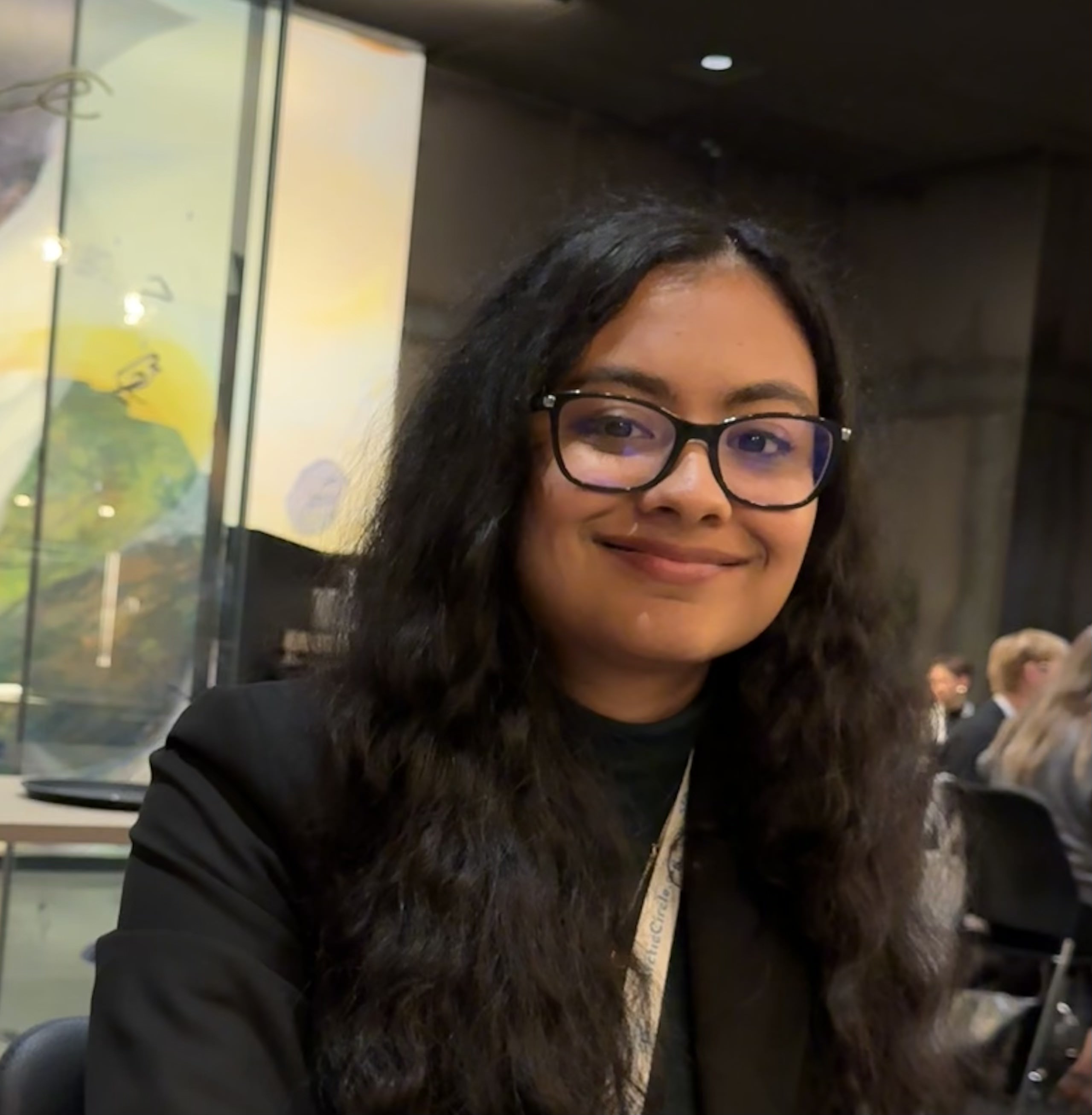 Ms. Vedika Mandapati
Ms. Vedika Mandapati Ms. Yolanda Molares
Ms. Yolanda Molares
14:30-15:30 Azerbaijan Time (GMT+4)
Linking Marine Areas within and Beyond National Jurisdiction: A cross-sectoral ocean governance approach in the context of climate change
The United Nations Convention on the Law of the Sea divides the ocean into different maritime areas. Around two-thirds of the ocean’s surface and nearly 95% of the ocean’s volume fall into marine areas beyond national jurisdiction (ABNJ). Increased human activity in these areas, including shipping, fishing, and seabed disturbance have developed into unsustainable practices threatening the health of ecosystems. Anthropogenic activities result in climate change and pollution from sea- and land-based sources and cumulative impacts, affecting marine life. These threats are widespread and transboundary in nature, creating challenges for the effective management and sustainable and equitable use of the ocean.
The cross-cutting nature of the threats to marine ecosystems from a variety of sectors and activities necessitates a cross-sectoral, integrated, and coordinated management approach among ABNJ users. However, the current global ocean governance framework is fragmented, with different regional and sectoral organizations responsible to meeting diverse mandates. These organizations have largely operated in ‘silos’. Consequently, cooperation and coordination across sectors at both global and regional scales often occur on an ad-hoc basis, or through participation in external projects or initiatives.
Limited coordination between sectors also results in poor understanding and awareness of different global, regional, and national priorities (e.g., those under different legal frameworks and conventions, or across different national ministries), as well as capacities to undertake activities in ABNJ. It is also common for governments to have different priorities across international fora, depending on the purpose or orientation of such fora. For instance, a forum focused on conservation may reveal views that conflict with those expressed in a forum focused on fisheries. These inconsistent priorities can thus make it difficult to define overall objectives and increase the likelihood of activities that undermine priorities. This is particularly problematic where the impacts of specific activities are poorly understood, and as such, precautionary approaches are advisable. External drivers, including government reshuffles and institutional turnover, exacerbate this problem.
The new Agreement on Marine Biodiversity of Areas beyond National Jurisdiction (BBNJ Agreement) which was adopted in June 2023, offers an opportunity to enhance coordinated, cross-sectoral governance measures for the sustainable use and conservation of biodiversity in ABNJ. A dedicated coordination mechanism, coupled with widespread recognition of the need for and willingness to take part in cooperative and coordinated activities, might be essential for cross-sectoral management in ABNJ. The BBNJ Agreement can act as a bridge to promote and harmonize cross-sectoral coordination at the global level.
This roundtable provides an opportunity to informally discuss the concept of cross-sectoral ocean governance with a focus on its application in ABNJ management, accounting for the need to link ABNJ and EEZ management. Participants will be asked to share their knowledge and insights on the topic which could provide input in the development of a conceptual framework or a policy for cross-sectoral ABNJ management being carried out within the framework of the Global Environment Facility (GEF) funded UN Environment Programme Common Oceans Cross-sectoral Project.
Agenda
Suggested areas of discussion:
Moderator:
Speakers:
Roundtable Participation:
To participate in this roundtable, please click the "Roundtables" tab in the top navigation bar. On the Roundtables page, click the JOIN NOW button for this roundtable at the start of the event. Please note that the JOIN NOW button will not be available until the event start time at 14:30 Azerbaijan Time (GMT+4).
There will be 20 seats available for this discussion, including seats reserved for speakers and moderators.
 November 21, 2024 16:00
November 21, 2024 16:00 Dr. Dan Bayley
Dr. Dan Bayley Professor Ana Queirós
Professor Ana Queirós Dr. David Obura
Dr. David Obura Dr. Ruth Dunn
Dr. Ruth Dunn Gizem Akdoğan
Gizem Akdoğan
Human-induced climate change, biodiversity loss, and declines in human well-being are severe and inter-connected crises that cannot be addressed in isolation. There is no solution to these acute societal challenges that does not include putting nature and the people that rely on it at the centre of any approach.
This event concentrates on the United Nations Ocean Conference (UNOC) ocean action panel theme of ‘leveraging ocean, climate and biodiversity interlinkages’. Talks will explore recent research around the connections between different marine and coastal ecosystems, and how these connections can improve our understanding of how natural systems function. The panel will further discuss how we can better link thinking around climate and nature for climate mitigation and adaptation; and how we can best use this new knowledge to effectively and equitably protect/restore these systems.
An expert panel studying these connections between marine ecosystems across the world will initially conduct short talks on their specialist topics at the interface of ocean ecosystems and climate. This will be followed by a Q&A and broader discussion of: remaining knowledge or policy gaps; future management needs to maintain essential functions and combat the effects of climate change; and equity in approaching these interlinked issues.
This session will be moderated by Dr. Dan Bayley.
AGENDA
ORGANIZER: Fauna & Flora
Add events to calendar
 November 21, 2024 18:00
November 21, 2024 18:00 Professor David Freestone
Professor David Freestone Ms. Valentina Germani
Ms. Valentina Germani Mr. Jérémie Adlerfligel
Mr. Jérémie Adlerfligel Dr. Lisa Levin
Dr. Lisa Levin Ms. Gina Marie Torry
Ms. Gina Marie Torry Ambassador Gina Guillén
Ambassador Gina Guillén Mr. Raphaël Goulet
Mr. Raphaël Goulet Dr. Miriam Balgos
Dr. Miriam Balgos Dr. Andrew Hume
Dr. Andrew Hume
BBNJ Agreement ratification and implementation is a necessity. As the first global ocean-related agreement that specifically addresses climate change, the Agreement on Marine Biodiversity of Areas beyond National Jurisdiction (BBNJ Agreement) is potentially a powerful tool for climate action. Global collaboration to ensure rapid ratification and implementation of the BBNJ Agreement could strengthen climate resilience by conserving biodiversity that underpins the carbon cycle, enabling sustainable use of ocean biodiversity, and climate-smart environmental impact assessments, directly supporting the ocean’s capacity to absorb carbon and mitigate climate change impacts.
This is one of the seven key messages of the COP29 Virtual Ocean Pavilion. It is for this reason that this event focuses on ongoing efforts to facilitate the early entry into force of the BBNJ Agreement to start exploring the opportunities it presents for ocean-climate action. Invited speakers including experts and representatives from government and intergovernmental organizations, and civil society will speak about the support needed by national governments and regional organizations in responding to this challenge as well as the resources that are being made available to them for this purpose. It also addresses differentiated needs among countries including the needs of landlocked countries in undertaking ratification activities.
This session will be moderated by Professor David Freestone.
AGENDA
ORGANIZERS: Global Ocean Forum and Plymouth Marine Laboratory
Add events to calendar

Plan to visit ocean exhibition booths organized by leading ocean and climate organizations to showcase new and ongoing ocean-climate-biodiversity initiatives. Take advantage of the free access to a wealth of information that can be ‘taken away’ in your virtual delegate bag. Exhibits for the COP29 Virtual Ocean Pavilion include the following:
African Union Development Agency (AUDA-NEPAD)
Australian National Centre for Ocean Resources & Security (ANCORS)
Blue Ports Initiative of the the Food and Agriculture Organization of the United Nations
Center for Coastal Studies
The Common Oceans Program
Communications Inc
Global Ocean Forum
MarViva
Plymouth Marine Laboratory (PML)
Thyssen-Bornemisza Art Contemporary Academy (TBA21)